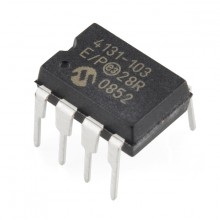
I picked up some digital potentiometers, partly as a building block for making a programmable filter for the ukulele tuner, but also just to play around with, as they seem pretty cool.
They act exactly like a traditional potentiometer (i.e. there's an end-to-end resistance of 10KΩ, with a 'wiper' that can travel from one end of the resistance to the other), but the position of the wiper can be controlled via digital signals. It seems that they do actually use physical resistors internally, in some fancy switched network. Anyway, these can normally be used to generate a variable voltage, but I'm also interested in being able to dynamically change resistance in order to tune a filter.
Originally, I assumed these would be an I2C interface (previous models I'd seen were), and didn't pay too much attention to the datasheet. I2C is great, because you can use 2 pins to control a whole string of devices, so long as they all have unique addresses. But it turns out that they're actually SPI, which is not so good for small microcontrollers, as even in its minimal form, it uses 3 wires per slave device. I'd ideally like to control 4 digital potentiometers with a single ATTiny85 - with just 5 data pins available (6 if I don't care about being able to reprogram more than once).
So - is it possible to control 4 or more SPI devices, using a single ATTiny85? Yeah, of course it is - with a bit of jiggery-pokery.
Continue reading "SPI addressing with minimal pins"


